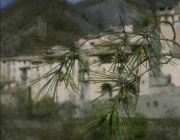Difference between revisions of "Aleppo pine"
Jump to navigation
Jump to search
| Line 15: | Line 15: | ||
* Cones are narrow ( 2-3 cm), long (5-12 cm), and ripen when 24 months old | * Cones are narrow ( 2-3 cm), long (5-12 cm), and ripen when 24 months old | ||
| − | == | + | ==Resources and Citations== |
* R.Gale, P.Gasson, N.Hepper, G.Killen, "Wood" in ''Ancient Egyptian Materials and Technology'', P.Nicholson, I.Shaw (eds.), Cambridge University Press, 2000, p. 334-371. | * R.Gale, P.Gasson, N.Hepper, G.Killen, "Wood" in ''Ancient Egyptian Materials and Technology'', P.Nicholson, I.Shaw (eds.), Cambridge University Press, 2000, p. 334-371. | ||
Latest revision as of 14:18, 5 October 2020
Description
A thin evergreen tree, Pinus halepensis, native to Syria and Palestine that is very resistant to heat and drought. The Aleppo pine produces a resinous wood that is fairly strong. In ancient Egypt, it was used for boats, weapons, general construction and coffins (Gale et al 2000). The resin is used to flavor retsina, a Greek wine.
Resources and Citations
Pinus halepensis; pin d'Alep (Fr.); pinho-de-Alepo (Fr.); Pino d'Aleppo (It.)
Physical and Chemical Properties
- Medium size tree (15-25m) with trunk diameter to 60 cm
- Thick bark is a dark orange-red with deep fissures
- Needle-like leaves are 6-12 cm long and produced in pairs
- Cones are narrow ( 2-3 cm), long (5-12 cm), and ripen when 24 months old
Resources and Citations
- R.Gale, P.Gasson, N.Hepper, G.Killen, "Wood" in Ancient Egyptian Materials and Technology, P.Nicholson, I.Shaw (eds.), Cambridge University Press, 2000, p. 334-371.
- Wikipedia: https://en.wikipedia.org/wiki/Pinus_halepensis (accessed April 2020)

